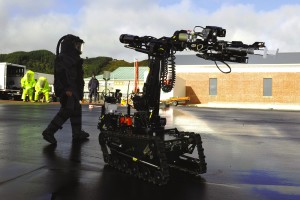
A proposal for supporting an international ban of manufacturing and usage of autonomous weapons has been submitted to the Icelandic parliament, Althingi. The proposal was put forth by four members of Parliament from the Left Green Party; Katrín Jakobsdóttir, Bjarkey Olsen Gunnarsdóttir, Steinunn Þóra Árnadóttir and Svandís Svavarsdóttir. They propose that Althingi supports the initiative of an international ban of the manufacturing and usage of autonomous weapons and entrust the government of Iceland to work towards that within the United Nations and other appropriate venues. The proposal is now being reviewed at the Committee of International Affairs.
In the proposal it says that even though technical enhancement in the field of AI, which is among others applied to autonomous weapons and killer robots, has been vast very little public discussion has taken place about AI’s very disputed part in modern warfare. This matter however touches on a number of ethical and legal questions. They mention the that the world is faced with the thread of a new arms race if this development will not be hindered and they compare the current technological leap in ware fare with the invention of gun powder or nuclear weapons centuries later. They furthermore remind that it is likely that those weapons will sooner or later end up in the hands of terror groups or other organizations not connected with countries nor governments and with no other aim than to seas power and wealth.
They also mention that more than 3.000 artificial intelligence researchers, scientists and related professionals signed an open letter released in Buenos Aires in July 2015 calling for a ban on autonomous weapons that select and engage targets without human intervention. Among those who signed the letter are physicist Stephen Hawking and Steve Wozniak, co-founder of Apple along with IIIM founding director Dr. Kristinn R. Thórisson.
The Committee of International Affairs has requested that IIIM reviews and comments on the proposal since IIIM is amongst those who have been very vocal on this issue. By publishing its Ethics Policy for Peaceful R&D in 2015 IIIM became the first research lab in the world to ban any funding and collaborations whose results has the potential to harm citizens with the misuse of information “intended to (2a) cause bodily injury or severe emotional distress to any person, (2b) invade the personal privacy or violate the human rights of any person, as defined by the United Nations Declaration of Human Rights, (2c) be applied to unlawful activities, or (2d) commit or prepare for any act of violence or way.
